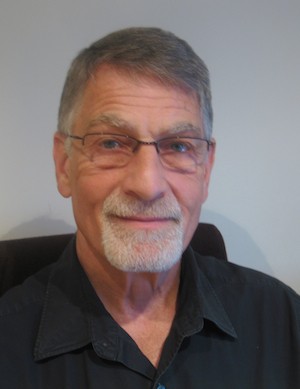Called to live in 'occupied' territories
Sam Hailes
The late author and teacher Michael Cohen embraced Christianity and cut ties with his Jewish background at an early age. But after an encounter with God at the Western Wall in Jerusalem, Michael discovered his Jewish background was not at odds with his new-found faith.

With his radical views came a radical lifestyle as the author of a controversial new book spent his final years living in a territory that much of the world considered "illegally occupied".
We spoke with Michael while he was in the UK, just four weeks before he passed away in Jerusalem after a heart attack on the 2nd April. We at Christian.co.uk send our condolences to his family.
1. What was your childhood like?
I was born in London just after the end of the Second World War into a very secular Jewish home. We were sent to a church school, which was very difficult because every morning there was assembly and we’d sit outside while everyone else went into the hall and had fun and sang songs. I felt from the age of five that being Jewish meant I was missing out on something. I didn’t like being Jewish.
Years later I met my wife and got engaged eight days later. Around the same time I met a clergyman who prophesied over me about being ordained which I thought was madness. 32 years ago I was ordained in Guilford Cathedral thinking 'now I’m a Christian, I’m not Jewish anymore'. It’s what the church said. I was comfortable with that.
2. What was your first experience of visiting Israel?
I was angry about being there because I always said I wasn’t going to go to Jerusalem until she lived up to her name and was the City of Peace.
Just a few weeks before we were there in 1990, the Arabs up on the temple mount were dropping stones down. The IDF fired shots in the air, normally that’s enough but this time for some reason the stones carried on. The soldiers fired into the crowd and 21 Arabs were killed.
As the guy was telling me this story at the Western wall, something snapped inside me and I went to the wall and prayed. I gave God an earful and told him how angry I was about being in Israel.
After a few minutes of standing there I heard the audible voice of God. It was so strong I turned around to see who was talking and there was nobody there. God spoke to me and said ‘Michael you are a Jew first.’ He said it twice. I had no idea what that meant because the world was telling me I wasn’t a Jew anymore. That threw me in a complete quandary.
3. How did this impact you on your return to England?
I gradually got sucked into the tiny Messianic community in England and eventually was offered a job by CMJ (Church's Mission to the Jews) to work as a travelling speaker, to teach on the things I was learning myself.
4. Where do you live, and why is it controversial to be there?
Aliyah comes from the Hebrew word to go up, to ascend. As an expression it meant to go up and take your place in your homeland and live there. We’ve been living in Israel since March 2003.
I live in a town called Ma’ale Adumin which is 12 km south east of Jerusalem on the way out to Jericho. We’re in the desert, which is beautiful. Geographically it’s in an area called Judea, and politically what mis-guided people call the occupied territories or if they’re broad minded they might call it disputed territories.
I happen to be a Biblical Zionist. I happen to take the promises of God to be literally true including the promises about the geography and the land of Israel is what God has told the Jewish people to populate and inhabit but it does say categorically in many places that there will be others living amongst us and we are to be hospitable to them.
I don’t see the land as being only for the Jews, I see it as under Jewish sovereignty to be somehow a reflection of the kingdom of heaven with people of different nationalities living together in harmony and unity.
5. How did your new book come about?
In 1995 I took a 3 month sabbatical. I felt God drop this title into my head – 'Two into one will go'. I wrote a first draft and when I came home I read it and thought it’s too shallow, there’s no depth it’s all opinions.
Two years ago I was sitting at my desk just praying ‘I need a project Lord’. I felt a call to go back to 'Two into one will go'. So I spent the best part of a year working on it, getting it to a point where I thought it had something significant which I hadn’t seen in any other book published in the Christian world.

6. What is Two Into One Will Go about?
The first section is called ‘how one became two’ and broadly looks at how the church and synagogue separated out. The fact they have become two separate religions and are called religions is completely wrong.
God didn’t give us something called Judaism and then something called Christianity. He gave us a way of life.
The second section is called '1+1=1' and looks at the Biblical feasts and broadly says if the church were to abandon the pagan feasts that have come in and readopt the biblical feasts we’d have a better chance of making Israel envious, which after all is the primary purpose of the church.
7. Isn’t it more difficult for Gentile Christians to accept teaching on Biblical feasts and following the law?
I’ve been accused of being a Judaizer, but I’m not for the simple reason that a Judaizer is somebody who follows Judaism, and I don’t want anyone to follow Judaism.
When Paul writes 'we are no longer under the law', he’s talking about the Talmud - the oral law, not the Torah - the written law. The people who were stood at the foot of Mt Sinai when the law was given were Jew and Gentile.
The 10 commandments stand, the Biblical feasts stand as a command and Yeshua [Jesus] said ‘if you love me you will keep my commands’.
8. As a travelling teacher, what’s your opinion of the Church at the moment?
I’m greatly disturbed by the lack of truth in the Church. There’s too much opinion coming out, not enough teaching about facts, reality and doctrine. There’s too much dogma.
The purpose of the book is to try and resurrect truth in the church, in the process we will have to discard a lot of stuff we’ve adopted because it’s not right.
9. What’s the best Christian book you’ve read?
I Believe in Preaching by John Stott. His treatise on the ministry of preaching is phenomenon. He was a great preacher, probably one of the greatest preachers of the Evangelical church of his era. There was an integrity about him, his sermons were well constructed. He had a relationship with God in Yeshua and it was very Biblical.
10. What has God been teaching you recently?
God has been teaching me about humility. It’s not recently, it’s ever since I became ordained. I was a postman before I was ordained. When you’re a postman you're invisible, you’re anonymous. Nobody cares who you are or what you think about anything.
But the moment you put a clerical collar on, suddenly everyone wants to know what you think about everything! At first I had no idea so I used to make it up. I was so arrogant it was horrible. People used to accuse me of arrogance and I got so hurt, I looked up arrogant in the dictionary, I didn’t like the definition. So I kept looking in other dictionaries to find a definition I did like!
The Lord has been speaking to me for years about being gentle in spirit. Biblical humility is not doing nothing, but doing everything in God’s strength.
A lot of the things I’ve said in the past I might still have said, but in a very different way with a lot more grace and a lot more gentleness. I’ve reached the good old age of 66 and I’m learning at last what it means to be gentle in spirit.
Latest Blogs

Bible
So Your Teen Wants a Bible? A Parent’s Guide to the 2026 Revival
Has your teen or grandchild asked for a Bible? Don't panic. The "Bible Revival" is real, but buying the right edition is key. Here is our guide to buying a Bible they will actually read in 2026.

Bible
Why Young Men Are Returning to the Bible (And Where to Start)
A "quiet revolution" is seeing young men across the UK turn to Scripture in record numbers. We explore why the Bible is resonating with a generation seeking purpose, discipline, and truth in 2026.

Bible
Why Today is the Best Day to Start Reading the Bible
Are you waiting for a "perfect time" to start reading the Bible? Discover why waiting for Monday, next month, or a quieter schedule is a trap, and why today is actually the best day to begin.

Bibles
Is the King James Bible OK for Catholics?
Can Catholics read the King James Version (KJV)? We explain the key differences between Catholic and Protestant Bibles, the "missing" books, and which translations are approved for Mass.

Bible
Are Young People Reading the Bible?
Is Gen Z leading a spiritual revival? A new Guardian article reveals a 134% surge in UK Bible sales driven by young people. We explore why 18-24s are turning to Scripture in record numbers.

Christian Jobs
This week's Christian Job opportunities (9 Jan 2026)
Your Next Calling Awaits: A Glimpse into the job opportunities posted in the Eden.co.uk Christian Jobs Directory this week.
